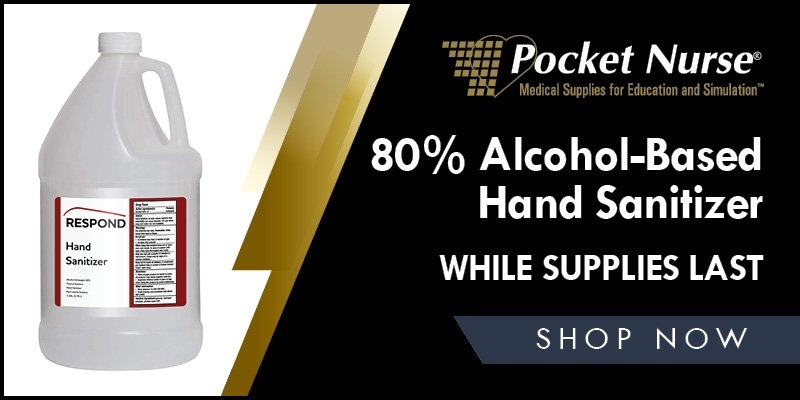
In the strange year that 2020 has been, we are happy that we can support your educational goals with accurate and informational articles. We look forward to bringing you more great content in 2021!
It’s estimated that by 2050, minority populations will constitute half of the general population in the United States. Minority populations face different healthcare issues than the majority population; cultural issues can come into play as well. Simulation is a wonderful way to educate healthcare workers on the needs and challenges that different populations face.
This article was part of a two-part series resulting from a survey that Pocket Nurse® sent out asking healthcare educators to share the challenges they are facing as they transition to online education. In this article, we looked at why camaraderie among students is important, and ways of building it even when education was taking place remotely.
Auscultation is the science of listening to sounds from the heart, lung, and other organs. It is a basic yet important skill for healthcare professionals. Yet study after study shows that healthcare professionals are only able to identify a small percentage of heart sounds. Instructors can bridge this learning gap with simulation and task trainers.
With the COVID-19 pandemic shutting down schools and classrooms, teachers are scrambling to continue to teach students. Especially in nursing schools and healthcare education programs, where simulation accounts for a percentage of the curriculum, a distance learning model is challenging. The Coraonavirus Aid, Relief, and Economic Security (CARES) Act can help institutions of higher learning invest in the best technology to help.
It’s estimated the transgender population in the United States is very small, with census number ranging from 0.6 to 1.2 percent of the adult population. However, this small population is disproportionally affected by mental health issues and homelessness. Unfortunately, transgender people who seek healthcare frequently face discrimination due to lack of knowledge and bias on the part of providers. Educators can address discrimination by creating simulation scenarios incorporating care for transgender patients.
One of the most important things healthcare professionals, educators, and students know – because they are reminded about it over and over again – is the proper way to wash their hands. Hand washing is the single most important protection against the spread of infectious disease. This post walks readers through “handwashing 101,” soap and water compared to alcohol-based hand sanitizers, and other strategies to avoid spreading infection.
A career in healthcare can have many stressful moments. Some healthcare professionals must deal with stress on a daily – even hourly basis. Yet students in healthcare programs get very little experience in dealing with career stressors. Stress Inoculation Training (SIT) is an educational method intended to help prepare people for stressful situations in advance, so when the real situation arises, the initial shock and pressure do not overwhelm them.
With the advent of COVID-19, the move to virtual instruction has been accelerated. As noted in “The State of Simulation Education,” virtual reality (VR) is revolutionizing the world of simulation, from stand-alone VR systems to manikins that incorporate VR and augmented reality (AR) into simulation. We’ve got three vendors who specialize in these technologies.
Part of celebrating Women’s History Month in March is profiling nurses and nurse educators from history on SimTalkBlog. This year we wrote about Virginia A. Henderson (Nov. 30 1897 – March 19, 1996), a nurse theorist and educator who advocated for a positive view of the nursing profession. She developed the Nursing Need Theory, which is still very much an active part of nursing education today.
 It is no surprise that this is the top blog post for 2020. We spoke with simulation experts and podcasters William Belk and David Shablak, the gents behind SimGeeks, a podcast about medical simulation. They ran down the CDC terminology about cleaning and disinfecting; EPA-registered cleaning chemicals, including what is likely to be effective against COVID-19; and spoke with Nick Brauer, the vice president of SimGHOSTS and a Simulation Specialist at the University of Tennessee Health Center. In other words, this blog post was chock full of good information for educators seeking to return to hands-on learning as the pandemic starts to lessen.
It is no surprise that this is the top blog post for 2020. We spoke with simulation experts and podcasters William Belk and David Shablak, the gents behind SimGeeks, a podcast about medical simulation. They ran down the CDC terminology about cleaning and disinfecting; EPA-registered cleaning chemicals, including what is likely to be effective against COVID-19; and spoke with Nick Brauer, the vice president of SimGHOSTS and a Simulation Specialist at the University of Tennessee Health Center. In other words, this blog post was chock full of good information for educators seeking to return to hands-on learning as the pandemic starts to lessen.
Again, thanks to all of our guest posters and readers for making SimTalkBlog a trusted source of information for educators in healthcare. We have one more blog post next week that you won’t want to miss, and then we will be back with new content for the new year.







